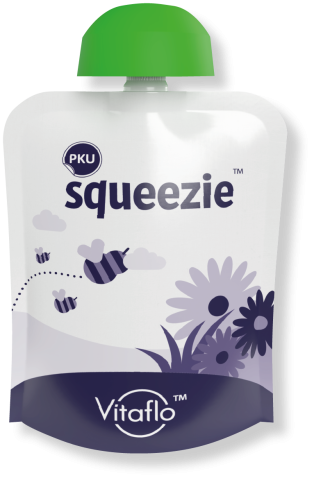
EARLY YEARS
Now that your child is starting to wean, it’s time to introduce their next stage formula that can be taken straight from a spoon.
PKU gel and explore are powder products and PKU squeezie is a ready-to-drink product specifically designed to be introduced at this time. Click on the products to find out more.

What is PKU?
PKU is short for Phenylketonuria (pronounced phe•nyl•ke•ton•uria)
PKU is a very rare genetic condition, in many countries, the incidence rate is approximately 1 in 10,000/ This means that, for every 10,000 babies born there will be only 1 new case of PKU.
When an individual has PKU, their body is unable to properly deal with a nutrient in food called protein. Protein is found in many foods but certain foods (e.g. meat, fish, chicken, nuts and eggs) have more protein than others. To be more exact, the body has problems with one particular part of protein; Protein is made up of ‘building blocks’ called amino acids.
One of these amino acids is called Phenylalanine (or Phe for short). There is an enzyme in the body called Phenylalanine hydroxylase (or PAH for short). PAH converts Phe into another amino acid called tyrosine. Tyrosine is needed for many important functions in the body. In PKU, the enzyme PAH does not work very well or it does not work at all. The main problem this causes is a build-up of Phe to high levels in the body which can impact on health.
High levels of Phe in young children over a prolonged period can lead to brain damage. The amount of Phe in the body is determined by measuring the amount of Phe in the blood. Long-term, blood Phe needs to be kept within specific limits which are known as the target blood Phe range. These limits are set by the medical experts working in this area.
In many countries, there is national newborn screening (NBS) in place for PKU. This means that every baby born in that country will be offered testing for PKU. This allows PKU to be diagnosed in the early days of life. Early diagnosis allows high Phe levels to be quickly reduced, preventing damage.
Early diagnosis combined with effective life-long dietary management leads to very good outcomes in PKU. Individuals with well-managed PKU can enjoy the same expectations in life (in terms of education, employment* and family life) as everybody else.
(*Some individuals with PKU on dietary treatment have been unsuccessful in applying for military roles, with inability to supply specialist dietary products in a warzone cited as the reason for rejecting their applications.)

Explorers club
If you haven’t done so already, why not register for the Vitafriends Explorers Club – an education programme for families managing PKU in the early years.
It’s packed full of recipes to help with the introduction of solid foods!
FIND OUT MORE


